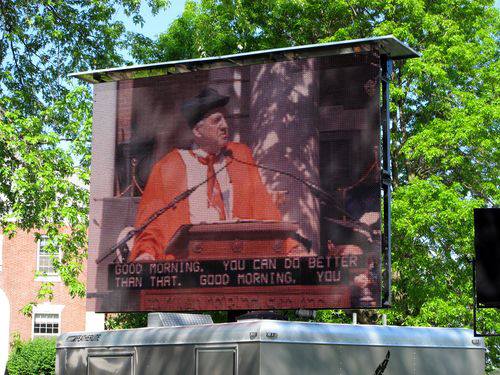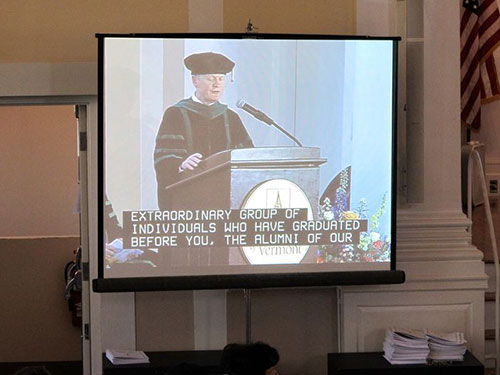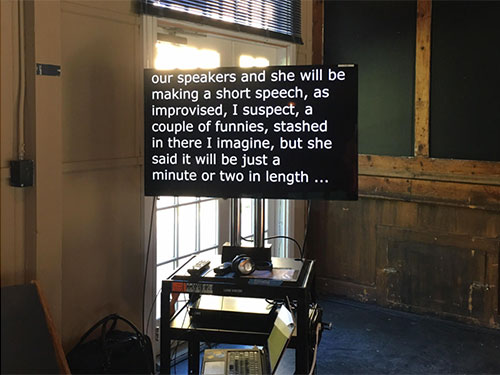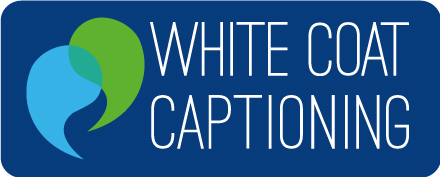Three Things You Need to Know About Captioning at Graduation Ceremonies
“Help! We’ve never offered captioning for our college commencement before – and we want to, but we’re nervous!”
Does that statement describe you and your team? You’re not alone. We’ve been getting a lot of questions along those lines lately, so let’s get started. We’ll answer these 3 main questions:
1. Who does it benefit?
2. What are my options?
3. How much does it cost?
1. Who Does It Benefit? (EVERYONE!)
Even in this age of striving towards the principles of universal design (you are, aren’t you?), old ideas die hard. Some people still believe that captioning is only for the deaf, that there aren’t many people who meet those criteria, and besides, maybe no one has even asked for it.
No!
In every audience, you can count on approximately 20% having some degree of hearing loss [source: Hearing Loss Association of America]. That’s just the tip of the iceberg. In every university or college commencement audience, you likely have grandparents, parents, and siblings for whom English is not a first language. Or people with auditory processing disorders. Or people who are sitting near other people who are talking too much. They benefit from captioning, too.
And people often don’t ask for it for myriad reasons. They don’t want to self-identify as needing it. They often don’t know it’s even a thing they can ask for. They didn’t know ahead of time that it would be needed or helpful.
I still remember the first time I captioned the Convocation Ceremony at the University of Vermont, many years ago. I didn’t even know that I was visible while I was working that event — there were so many people and it was in a large, packed gym, and how could someone identify that person using a court reporter’s machine (if they even saw that) with the captions that appeared on a screen about 300 feet away? But after it was over, I packed up my things and started rolling my case of equipment to my car, and a family ran to catch up with me in the parking lot.
“Are you the one who was doing the captioning?!”
“Yes!”
“Ohmygod, thank you, thank you! My grandmother is from Brazil, and she would not have understood a word of it, but she was almost crying because she could read and understand all of what was going on!”
On the other hand, my nephew graduated from one of those “colleges on the hill” in New England, and unfortunately there was no captioning provided. My sister and my mom have perfect hearing. They were sitting near a tree to stay out of the hot sun. The tree’s leaves were rustling, the people around them were having their own little party (talking too much!), and the catering crew was preparing the big after-commencement luncheon right behind them. They couldn’t hear the speeches at all. My sister said she kept on looking for captioning on the big screens, but kept on being disappointed that there was none. For her son’s big day, and for that super-expensive and important event, a simple addition like live captioning could have improved the experience for everyone.
2. What Are My Options? How Do We Do It? What Does It Look Like?
There are various ways it can be done. The captioning itself can be done remotely or onsite.
You should hire a reputable captioning company to do the captioning. Ask for recommendations from other universities and colleges that have used captioning for their events. Ask questions about speed, accuracy, experience, and professionalism. Commencement Day is the biggest day of the year for your institution, your graduates, and their families. Everything about your event is on grand display and reflects upon you. Excellent captioning will enhance your event and your reputation. Bad or even mediocre captioning will detract. Don’t skimp on it.
The captioner(s) will work together with your production team.
Outdoor Captioning, One Large Ceremony
Here is a photo of an outdoor captioning screen at a Commencement ceremony at the University of Vermont. This requires a captioning encoder, tied in with your big AV vendor’s equipment. More than likely, any large AV vendor has worked with captioning before, and they either own or know where to rent an encoder and what to do to make it work. But if they don’t already know how, we will be happy to work with them to secure an encoder and get it set up correctly.

Indoor Captioning, Multiple Ceremonies
Here is a picture of a simple setup using the encoder with the support of a separate videographer capturing the image of the speaker, just for the purposes of the captioning. This is another commencement ceremony (Medical School!) in the Ira Allen Chapel at the University of Vermont.
UVM is a great model of universal design in its large events. It employs live captioning at ALL of its commencement and commencement-related ceremonies — all 18 or 20 of them over several days — and has done so for several years now — regardless of whether anyone asks for it. A team of three captioners from White Coat Captioning, working with a very able broadcast engineering team at the university, manages all of the quick venue-moving and setting-up and switching-out that is required to cover all the ceremonies. UMass Amherst is another outstanding example.
At UVM and several other universities and colleges, we use an encoder. But nowadays with the new apps available, (e.g., StreamCast by StreamText, and others), you can achieve this same effect without the complication and expense of an encoder. You just need a laptop connected to a projector and hardwired internet.
Both of these setups are very nice, because your audience members who need the captioning don’t have to keep moving their heads and eyes back and forth between the captioning screen and the stage to see the speaker.

Low-Tech, But Effective!
The completely low-tech way is to just have text on a TV screen. Like this:
In all cases, I strongly encourage you to place the captioning screen high enough so it can be seen above everyone’s heads and read by as many people as possible.
You might also consider having multiple captioning screens in the venue. You may think the captioning is only being used by the one person who requested it, or people who are asked to sit in a special place, but I would ask you and your team to trust my vast experience on this: There will be a large percentage of your audience who will need captioning (without having asked for it) and will very much appreciate that it’s there — even people with great hearing — because in large events like this, the acoustics are always challenging. And if it is not visible to everyone, you will very likely get complaints from people who say they couldn’t see it from where they were sitting.
Ask me how I know.

3. How Much Does It Cost?
We would be happy to give you a free estimate if you give us some more information about your event and the services you’d like. Commencement Season is a very busy time for captioners. It is not too early to start planning ahead for 2020 Commencement and get your captioners booked. If you want to caption your 2019 Commencement, we might still be able to accommodate you.
But do add quality live captioning to your event. Your alums, families of graduates, and guests will thank you.

